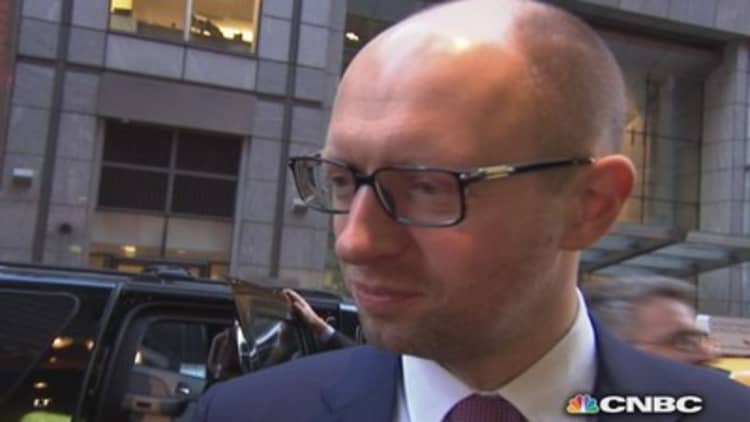
Russian Foreign Minister Sergey Lavrov insisted Russia had no plans to invade eastern Ukraine but would respect this weekend's referendum in Crimea.
Speaking at the residency of the Russian Ambassador to London following talks with his U.S. counterpart Secretary of State John Kerry, Lavrov said that "differences remained" between the West and Russia over the future of the country, but stressed that the ongoing crisis was not the result of Russia's actions.
"We will respect the expression of the will of the Crimean people in in the upcoming referendum," Lavrov told reporters, adding that Russia did not need any international structure to help it deal with Ukraine.
"The Russian Federation does not and cannot have any plans to invade the southeastern regions of Ukraine" he added, following recent clashes in the Ukrainian city of Donetsk.
(Read more: Kerry: Russia's Putin won't make any decision on Crimea until after referendum)
But Kerry - who described the dialog with Lavrov as "constructive" - said he would like to see "actions and not words" that Russia was diminishing its presence in Ukraine.
Kerry added that Russia's President Vladimir Putin was unwilling to make decisions on Crimea until after the referendum.
"Our position on the referendum is clear," said Kerry during a press conference. "We believe the referendum is contrary to the constitution of Ukraine."
(Read more: Crimea referendum:Why it's so important)
The comments come after Arseniy Yatsenyuk, Ukraine's interim prime minister, told CNBC he believed the referendum in Crimea would inevitably result in the population rejecting Ukrainian rule - but remained adamant that the country will do all that it can to protect its territorial integrity.
"(It) seems to me that this referendum is already pre-ordered and that we can easily predict the outcome," he told CNBC in New York late Thursday.
"But Russia is to stick to the charter and to its international obligations."
The Crimean population is likely to vote along ethnic lines, with the majority Russian-speaking population dominating in the referendum. Yatsenyuk's comments came after a standoff between himself and a Russian diplomat in front of the United Nations on Thursday.
The Ukrainian leader urged Russia to move towards negotiations to try to end the tensions in the eastern European country. Meanwhile, Russia's ambassador to the United Nations, Vitaly Churkin, told the emergency meeting that Moscow does not want war with Ukraine.
All members of the Security Council except one expressed their profound support to the territorial integrity and sovereignty of Ukraine, according to Yatsenyuk. He added that even after Sunday's vote - which is seen as illegal by Western powers - he will continue to try to preserve Ukraine's territorial integrity.
He declined to answer whether this would mean military action but said that it would include "all possible means."
(Read more: Why Crimea matters)
"Using all leverage, from the international community, from our international obligations and pressing on Russia to stop this mess," he told CNBC.
Ukraine's minister for economic development, Pavlo Sheremeta, told CNBC that international diplomacy was "one of the most effective tools" available to Ukraine in its current straits.
"Overall actually, I think that's one of the most effective tools," Sheremeta said on Friday. "We are not entering into any kind of military activities, we are not being provoked, we are just protecting our property - and that was well-appreciated."
German Chancellor Angela Merkel on Thursday warned of a "catastrophe" if Russia does not drop its plans to annex Crimea. U.S. Secretary of State John Kerry said if Russia goes through with the referendum in Crimea on Sunday, the U.S. and the West will respond with a "serious series of steps."
Sheremeta said: "We don't want sanctions, we don't want wars, we don't even want trade wars.
"As I mentioned we want to have peace, we want to have trade, we want to have exchange, we want to have debate. But we want to keep the territory of Ukraine integrated and the whole country independent."
—By CNBC.com's Matt Clinch. Follow him on Twitter @mattclinch81.

